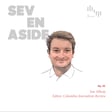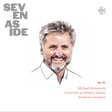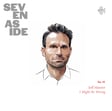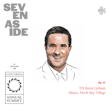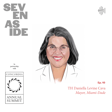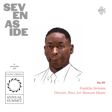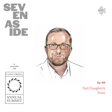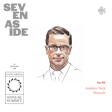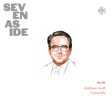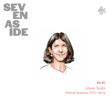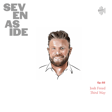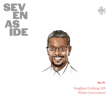Become a Creator today!Start creating today - Share your story with the world!
Start for free
00:00:00
00:00:01

Ethan Zohn & Dr. Tommy Clark
The Grassroot Soccer co-founders on twenty years of social impact work, the nonprofit’s scrappy beginnings and recent foray into mental health, Covid ingenuity and systemic challenges to public health globally
Transcript
Founding Grassroots Soccer
00:00:00
Speaker
you
00:00:05
Speaker
With his winnings from Survivor Africa, the 2001 edition of the reality TV phenomenon, Ethan Zahn banded with Dr. Tommy Clark and a clutch of fellow pro footballers to found Grassroots Soccer, a nonprofit using the world's most popular sport as an intervention with young people and their communities hardest hit by HIV AIDS. 20 years on, Grassroots Soccer's footprint spans 60 countries and five continents. While Zahn, who survived double bouts of cancer in his 30s and 40s, has expanded his advocacy and social entrepreneurship well beyond his original creation.
00:00:34
Speaker
Marking a milestone 20th anniversary, Ethan and Tommy reminisce here about the organization's scrappy beginnings and hopes for the future, shed light on its recent foray into adolescent mental health, and talk about the challenges to public health systems globally. We also sidebar with Ethan to hear about his journey from cancer diagnosis to championing cannabis.
00:00:56
Speaker
Ethan Zahn and Dr. Tommy Clark, thanks so much for joining us. For the uninitiated in our audience, set the scene for us. Take us back to the beginning. Give us the grassroots soccer founding story.
Inspiration and Early Challenges
00:01:08
Speaker
We got to get in your little time machine and go way back to the year, probably 1999 and before Tommy's father had a sabbatical, he was coaching at Dartmouth College, had a sabbatical, went over to Zimbabwe and was coaching for the Highlanders Football Club and the Zimbabwe Premier League. And Tommy was a youth there and was kicking around with all the kids and obviously that memory stayed with him.
00:01:32
Speaker
And then a bunch of years later, you know, Tommy's father started sending, you know, US based soccer players over to Zimbabwe to play for the Highlanders. And so, you know, Tommy went over, I went over following a couple other, you know, teammates of ours. And, you know, personally, and I think Tommy had a similar experience is that while we were over there, we witnessed firsthand what was happening with HIV and AIDS, and how it was just destroying this community that we are part of.
00:02:00
Speaker
And some of our friends got sick with HIV, they were kicked off the team, ostracized from the community, and lived a really kind of sad, lonely end to their life. However, no one was doing anything about it, including myself, including Tommy at the time. What can one person do or a couple people do to help this massive problem in all of Africa? So nothing really went down for a while.
00:02:23
Speaker
I was fortunate enough to be chosen to go on a reality television called Survivor, which happened to take place in Africa and Kenya. And I had an experience there where I was able to end up playing soccer with all these HIV positive children in the middle of this reality TV show called Survivor. And so when they returned home from Survivor, I was introduced to Dr. Tommy Clark, who's here on the call today. And Tommy shared his vision for grassroots soccer.
00:02:50
Speaker
Yeah, it was just kind of confronting like, yeah, just what Ethan was saying, just people who we knew teammates passed away from this disease. And so you just wanted to do something. And we'd also had the experience of sort of being, you know, soccer celebrities.
00:03:08
Speaker
So that was it, with these two things colliding and sort of this idea of soccer could be a good way to reduce the stigma. Nobody was talking about it. I lived there for a year, went to multiple funerals, and I had not a single conversation about HIV. I never heard those words. That was the genesis, was could we do
Setting Up and Gaining Support
00:03:29
Speaker
something? Could we do anything?
00:03:31
Speaker
I was a medical resident pediatrics at the time and we sort of all met around my dining room table and kirk and ethan and metembe and others jason hicks and bill wiese and various other folks. We sat around and sort of mapped out what are the things that you need to get done well you need a curriculum we need to go over there and see if people would even.
00:03:51
Speaker
be willing to go along with this. Kirk's mom was a nonprofit person and she said, and Kirk said, well, my mom says we need to become a 501c3, you know, try and figure that out. And then we needed, apparently we needed someone to write a $500 check to submit our application, which seemed like a preposterous amount of money. And so that was kind of just to kind of give you a vision of what the early days looked like. And then we went on a little trip.
00:04:17
Speaker
September 2002 to Bullewell Zimbabwe. And we met with teachers, we met with former teammates and current members of the Highlanders team. We met with regular folks in the community and we just kind of in retrospect, these were focus groups. At the time, they were just kind of talking to people and see what people think. And people were very excited about this idea.
00:04:43
Speaker
One of the headmasters of Mozilla Kazi High School said, if you don't change your culture, you'll get eaten by the vultures, sort of in a Muhammad Ali-esque type way. He was a very influential headmaster in the community, and he felt that this was exactly what we needed to do. The culture needed to change. People needed to talk about this.
Curriculum Development and Expansion
00:05:03
Speaker
You know, this couldn't stay in the closet, in the dark. We need to talk about HIV. We need to talk about sexuality. We need to support people, all of these things. So, you know, we developed a curriculum, you know, trained people, started collecting data early on. Turned out to be a very good idea. Our first funding, believe it or first, people like Mike in-laws and Ethan's mom and her friends, you know, people like that would support the early, early efforts.
00:05:32
Speaker
All the sudden we publish some data we had gates foundation paper which is cap and foundation all the sudden we were in a real entity and we were sort of off and running.
00:05:43
Speaker
And so from this germ of an idea to this very sophisticated curriculum, can you talk a little bit about the nuts and bolts of the curriculum? You're now in what, 60 countries? How did you scale up? And I know some of that was a combination of direct operations, field operations, and also partner implementation. If you talk a little bit about both those things.
00:06:04
Speaker
Our basic concept early days was we were to train professional soccer players, professional coaches, and peer leaders in the community with a curriculum that we developed on anything that was driving disease amongst adolescents and youth.
00:06:20
Speaker
So something like HIV and AIDS, female reproductive health, mental health, gender norms, gender-based violence. So all these issues that are affecting adolescents in underserved countries is what we wanted to focus on. Soccer is the hook, but once we get them in there, then we're delivering these health interventions. And the people that are teaching them are their role models, their heroes, these idols in the community. Because as we all know, soccer is the world's most popular sport, and every little kid wants to grow up to be professional soccer players.
00:06:49
Speaker
So you can imagine the impact when we send some of these leaders into the classrooms and kids model the behaviors of those that they respect. So that's like the big picture and kind of how we were able to kind of push these health interventions. And don't forget, like 20 years ago, no one was really using soccer and sports to deliver lifesaving health interventions.
00:07:10
Speaker
you know, lots of people were using soccer to develop kids into players to get contracts to sell to make money. But that's not what we are into. Like we are into, you know, using this sport, this global sport, to be able to deliver these kind of life saving interventions.
00:07:27
Speaker
And so kind of that's the early kind of how grassroots software model works.
Scaling Globally and Impact
00:07:32
Speaker
In early days, like Tommy said, we were just in Zimbabwe at first, but we invested heavily into our monitoring and evaluation so we could actually prove what we were doing was working. And once we were able to do that, that's when the lights went on and everyone started to like pay attention and say, wow.
00:07:47
Speaker
Soccer really does have a place in the world in a place outside the lines of the soccer field where we can use this sport to really create change in the world and we are able to scale up. There's so many ways to sort of think about this. Another way to think about what we do is like really looking at the best data, the most best evidence.
00:08:05
Speaker
For example, turns out that research shows that adolescent girls having a partner, sexual partner who's four or more years older, puts you at much, much higher risk of becoming victim to violence, unplanned pregnancy, inability to negotiate, save sex, HIV, et cetera. So having this older partner and sort of the conversely, the gender equitable partner,
00:08:32
Speaker
Partner, who you have a more equal relationship, you know, puts you a much lower risk. So at Grassstalker, we take pieces of data. That's just one example. Could be lots of different things like that. And then we sort of take those and we put them into a format that's adolescent friendly. The activities, so pieces of information are sort of a part of a curriculum.
00:08:52
Speaker
It's activity-based. It's fun. It's led by people who are excellent at connecting with and relating with adolescents. So those are sort of the first two pieces. You know, if you showed up, you know, you would guess you were watching a soccer training, you know, kids dribbling in and out of cones or different things like that. But if you got a little bit closer and listened,
00:09:15
Speaker
you would hear the coaches using those games to make metaphors make points all the while keeping it really really fun and then the third part so taking the research then sort of you know number two is sort of putting it into this you know uh adolescent friendly into our skills approach we call it skills curriculum fun safe you know activity based and then the third part is then sharing that with partners the idea
00:09:44
Speaker
You know, it was just that local people, local organizations knew their communities better than we ever could or would and care about their communities. And that this model was adaptable, replicable. Other people could deliver it. And we did research.
00:10:01
Speaker
research showed that other people could deliver this just as well as we could, other organizations. And so I think we have right now 85 active partners, and that includes eight African governments. And so, you know, we might work with the Ministry of Health in Zambia. We work with the Ministry of Education in Ethiopia and really work alongside these organizations, helping them deliver these programs.
00:10:31
Speaker
So really, in a way, the organization, we still do direct delivery. We still work directly with adolescents on the ground. But 95% of our impact comes through partners.
Challenges and Milestones
00:10:44
Speaker
Give us a snapshot. 20 years on, what is the Grassroots Soccer Impact Report Card? Where does the mission stand?
00:10:50
Speaker
It's a good question. One way to look at it is it's a success story. We've certainly achieved more than we ever dreamed that we would achieve. The other way to look at it is look at the environment and the adolescent population in Africa is set to double in the next 30 years.
00:11:12
Speaker
Adolescents in Africa are approximately nine times more likely to die than their peers in the West. HIV-AIDS, despite incredible progress, continues to be the number one cause. Pregnancy, unplanned pregnancy-related complications, number two, violence, trauma, are up there too. So there's a huge amount to be done. I think our partnership model allows us to punch
00:11:36
Speaker
well, well, well above our weight. I just feel this, you know, in a way, a pressure to get to it, right? We need to create great evidence-based curriculums for adolescents and we need to share those with partners and we need to do as quickly as possible.
00:11:53
Speaker
I love sharing these numbers just because it's just a testament to what Tommy created, but we have had programs in over 60 countries, 18 million graduates, 13,000 trained coaches. I think we've raised over 115, 120 million since inception.
00:12:11
Speaker
And we're looking to the next 20 years as well. And we want to use this model to create impactful interventions for any disease that's for adolescents.
Innovations During COVID
00:12:23
Speaker
So right now, as we all know, mental health is a huge problem amongst youth and adolescents around the world.
00:12:29
Speaker
So Grassroots Soccer has just launched our new signature mental health curriculum called Mind Skills. And we ran a pilot project in Aberdeen, Scotland with the Aberdeen Football Club and which Tommy's father played for. And we also did it in Zambia and got some really great results. So now we are looking to scale up with our mental health program, which means partnering with other organizations, training them to use mind skills so then they can use it within their own
00:12:56
Speaker
community. We're even kind of exploring ways to bring grassroots soccer's mind skills to the United States as well and work through whether that's, you know, boys and girls clubs, soccer clubs, school systems along those lines.
00:13:09
Speaker
I'm glad you bring up these milestones and these new methodologies. Thinking back 12 years to South Africa World Cup, since we're in a World Cup window right now, and how did Grassroot channel that energy and that attention into focused sustained growth beyond the tournament?
00:13:27
Speaker
It allowed people to see what we were doing. So that was really the main thing, was a lot of people came to the World Cup, a lot of corporations, foundations wanted to do something around the World Cup. And so basically brought a lot of eyeballs to what we were doing. And not all of those people continued, but many of them continued to be champions and sort of understand the role that our approach and soccer could play, speaking about adolescent health.
00:13:54
Speaker
Ethan, you talked a little bit about the evolution of the programming, certainly with his MindSkills edition. Going back to something that Tommy was touching on, which was the fragility of health systems. We've been reading reports recently of condom shortages in certain countries due in part to inflationary pressures. And it just underscores, again, the dysfunction of some of these delivery systems. As an organization very much in the front lines of health crises, in developing countries in particular,
00:14:24
Speaker
What was your COVID experience? How did it alter the game for your interventions and outcomes? Yeah, I'm happy you asked that question. COVID had the potential to crush us because as an organization where people come together and meet and play sports, and that's kind of how we deliver our curriculums, that was completely shut down.
00:14:46
Speaker
as any great soccer player does or soccer organization, we had to pivot and adapt. And so we went a little bit old school, but we created ways for us to be able to continue, you know, working with adolescents. So we created a magazine where now these are turned our curriculum into a magazine, like, you know, paper newsprint magazine that we could hand out to kids, they could take it home, they could go through it.
00:15:10
Speaker
We created WhatsApp meeting groups so kids can speak with their coaches through WhatsApp, continue the conversations just so they weren't cut off completely from the work that we're doing. So in effect, COVID, I'm not going to say it was a good thing for grassroots soccer, but we are able to continue working and doing a good job at what we're doing.
00:15:32
Speaker
Yeah, one addition, I guess some of the things, right, the channels changed, but sort of the core stayed the same. We needed to be interactive and needed to be fun. I needed to be evidence-based. So a lot of those things stayed the same, but like Ethan was describing, the magazines changed. Another one just worth mentioning, I think Ethan is the Viamo. We partnered with a technology company to create a mobile phone version of our curriculum. So an adolescent can call this toll-free number.
00:16:01
Speaker
And they feel like they're part of a skills curriculum. There's a coach, they're sort of, it's interactive. They can answer one or two. They can hear a crowd cheer if they get a ride or grown. If they get it wrong, they can, you know, keep looking for more information. We've rolled that out. It's still early stage, but already we have 47,000 adolescents who have logged on, which is a huge number.
00:16:26
Speaker
And this is exciting. I think it offers a couple of, like the magazines, it allows adolescents to sort of access information in privacy in their own time. And without necessarily, especially with the phone-based channel, without sort of the need of having a grant and a coach showing up, we're looking at these different approaches as standalone interventions. We're also looking at how do these interventions supplement and support our existing in-person delivery.
00:16:56
Speaker
I think the future is really really exciting how these things can come together and really thinking about a. You know a web of sort of support services around an adolescent.
00:17:08
Speaker
what Tommy said, like, it's got to be fun and cool. And like, I think grassroots soccer has been good at creating a culture, you know, a place where kids want to be. And a lot of these kids that go through the program end up being grassroots soccer coaches, they want to stay in the system. So we're a youth led organization, which means like, we're always working with the youth to figure out what's going on. And then we work with them again, to fix it, like, and if it's going to be effective, it's got to be cool. And if it's going to be cool, it's got to come from the kids we serve.
00:17:36
Speaker
I think that's a really neat way that we're able to create our soccer-based games that have health messages wrapped in them. Did COVID at all enable you to reset or reframe the conversation with your stakeholders, with your partners around public health in the context of economic resiliency?
00:17:58
Speaker
I think COVID was a good example of how something over there can affect somebody over here, sort of interconnected planet and the implications of a public health crisis. So I think it did, obviously COVID exacerbated, you know, mental health issues for young people. You know, Ethan already spoke a little bit about our work there. Initially, right, thinking about, you know, people who are,
00:18:24
Speaker
who have mental health challenges are, you know, more likely to have, you know, they're more likely to contract HIV, more likely to be victims of violence and vice versa, people that are victims of violence, more likely to be depressed. And so we kind of started off there, but then kind of quickly realized like, look, there's a lot of adolescents who could really benefit from these programs. So yeah, I think COVID brought adolescent health and how interconnected we all are. It brought that to the forefront.
00:18:51
Speaker
Well, among the legacies of the last several years has been a broad re-appraisal, a re-examination of our systems and institutions. Philanthropy and corporate giving are no exceptions. Grassroot Soccer has enjoyed relationships, as you mentioned, the Gates Foundation as one of your early partnerships.
Evolving Funding Strategies
00:19:10
Speaker
How has the Grassroot relationship with an approach to corporate partners, corporate engagement, how has that changed over the years?
00:19:17
Speaker
You know, the main ways grassroots soccer raises money, I guess you can say, to help fund our programs is through government grants, other foundations, high net worth individuals, and like events, you know, big gala events or marathon endurance teams.
00:19:34
Speaker
So I think early days, and Tommy, you can correct me, we were looking more for the government grants and foundations. However, once folks got word of what we're doing and how good we're doing it, I think brands and corporations wanted to get involved.
00:19:50
Speaker
Because you know it's a good marketing opportunity in addition to helping people at the same time so you know they're getting taken a couple boxes there if you partner with a sport based charity. We've partnered with some great folks in the past you know mac aids fun that's a foundation but it's also brand x on same brand as well as a foundation.
00:20:11
Speaker
But, you know, we work with Nike and Puma over the years, the red campaign. And so I think brands and corporations, you know, see a benefit in supporting grassroots soccer because of obviously the incredible work we've done and the proof that what we're doing is working. Ethan, to you for a second, your social entrepreneurship extends beyond grassroots
Ethan Zahn's Personal Journey
00:20:31
Speaker
soccer. Among other things, your battles with Hodgkin's lymphoma led you to become a crusader for cannabis legalization. Talk about that journey, how you've been involved and what your position on the issue is.
00:20:41
Speaker
You know, from an early age, you know, I always felt the kind of desire and inspiration to, you know, just help other people. You know, when I was 14 years old, cancer came into my home and it took my father away from me.
00:20:53
Speaker
I just felt I understood the power of community, the power of helping others because focusing on the plight of another human being helps you heal as a human being. So the social entrepreneurship theme of my life runs through pretty much everything I do, whether that's using soccer to teach kids to make healthier choices in life, whether that's
00:21:14
Speaker
going through cancer, which I did, and I'll get into that in a little bit, and then kind of using my nightmare situation to help other people in the world. And then so everything I do, I try to have a little charitable component to that, including, you know, my entry into the cannabis world. You know, 2009, I was diagnosed with a rare form of blood cancer, and I went through multiple rounds of chemotherapy, 22 blasts of radiation, and two bone marrow transplants.
00:21:40
Speaker
And as you can imagine it was a pretty horrible five years of my life and like i said to me cancer equal death because that's what happened to my dad and i'm like oh my god this is exactly what's gonna happen to me. Especially after you go through this and relapse and you go through it again it's just a nightmare situation emotionally physically spiritually.
00:22:02
Speaker
And so they were pumping me full of all these pills and synthetic drugs. And when a doctor tells you to do something or you'll die, you pretty much do it, right? There's no choice there. But for me, once I was done with my second transplant and they sent me home and they're like, okay, you're in remission.
00:22:20
Speaker
For me, that's when shit hit the fan. There was debilitating anxiety, these invisible scars that needed healing, dump trucks full of uncertainty. Like, how do you pick up your life as a young adult and make the right choices when there's a 50% chance that you might not be around in five years, right? So my anxiety got so bad that it was just I couldn't leave the house. And that's when I started to experiment with cannabis and CBD.
00:22:46
Speaker
You know, growing up as a competitive athlete, as a professional soccer player, never touched the stuff.
00:22:51
Speaker
I mean, I tried it second semester of my senior year. Don't tell my mom, you know, you know what it's like going to these division three liberal arts colleges, like a Skidmore or Vassar, you know, that's all around you. So I tried it, of course, but it just wasn't my thing because I wanted to play soccer. And then obviously when cancer hit, I was aware of it and of the benefits that it could give to someone who's going through cancer treatment. So yeah, I started experimenting with cannabis while I was going through treatment.
00:23:19
Speaker
And to be honest, it was a really horrible experience because I was living in New York City and I had like no access to medical cannabis. It wasn't even really legal back then since 2009. So I stayed in the streets of New York City in a mask and gloves and balls from chemo talking to a drug dealer. And like this drug dealer selling everything. He's not just selling weed. He's selling like Coke and ecstasy and all this stuff. And here I am like doing an illegal activity on top of a horrible cancer situation.
00:23:47
Speaker
It just wasn't a pleasurable experience. And so I decided I wanted to help erase some of the stigma around using a plant-based to help mitigate some of the side effects, you know? And so that's kind of what I did. And I got deep into cannabis. It really helped me. You know, I could sleep, less pain. I could eat. I was a lot more fun to be around. You could ask everyone.
00:24:08
Speaker
Help me myself off of some of the drugs that they were just filling my pockets full so after i kinda got you know in remission i became a. The chief purpose officer at mont kush farms in plainfield vermont which is a hundred and sixteen acre farm.
00:24:25
Speaker
We produced high-quality organic CBD rosin. And so that was a really fun experience. I moved up there, we worked on the farm, I planted, I harvested. I helped create the partnerships between the local community and the farm, as well as kind of open up doors for research. So we had partners with Michigan State, we had partners with Cornell. So creating those partnerships to help erase the stigma with cannabis, retell the narrative,
00:24:53
Speaker
where this is a medicine, this is a plant-based medicine, so that was important for me. And then my fellow co-founder at Grassroots Soccer, we launched a new organization called Safe Roots Foundation, and we are a new wave in teenage drug misuse prevention. And using the same model from Grassroots Soccer, we kind of apply that to the cannabis industry, where we are raising money from the legal cannabis industry, and then we distribute those funds to the best evidence-based teenage drug prevention programs across the country.
00:25:22
Speaker
We feel cannabis is good for public health, but we also feel if more kids start misusing cannabis and drugs in general, it's bad for the industry, it's bad for the kids. So how can we educate these kids in a language they understand, tell them the truth about cannabis and drugs? Evan, you and I, in high school, we had a cop come into gym class and they said, this is Coke, this is actually, this is weed, don't do it, you'll die.
00:25:44
Speaker
It obviously didn't work like what happened with the opioid crisis. I don't think that messaging around drug prevention really works. Mothers against drunk driving doesn't really work. So we want to kind of change the way we teach kids about proper not proper drug use but like
00:26:01
Speaker
you know, the truth behind, you know, cannabis and all these drugs. So we created an after-school sport poach curriculum. This curriculum enables any sport coach, not just soccer, to implement these fun game-based activities for their teams to help kids, you know, figure out a little bit more about drugs and the proper not to misuse drugs and help identify other kids who may be misusing drugs. We're excited about that. In your view, given your many routes into this space, your many angles,
00:26:31
Speaker
Where does public opinion stand? Where does lawmaker sentiment stand as it relates to therapeutic, if not also recreational use?
Cannabis Advocacy and Exercise Oncology
00:26:43
Speaker
I mean, as you can see, more and more states are choosing to make cannabis legal medically or adult use. I don't know the total number, but I don't know. I think it's up there right now on states. So I think the trend is moving in that direction.
00:26:59
Speaker
I do feel that there needs to be a lot more education, a lot more research, and that's the part that I'm excited about, obviously. It's a moneymaker, right? Like, you look at what's happening in all these states in terms of extra funding through the taxing of cannabis is going to the states so they can help, you know, education and infrastructure. So I think that's a good thing, right? And I also feel that for those folks
00:27:28
Speaker
where other forms of medicine is not working. This might be an interesting approach to cannabis has grown from the earth. Nature is the world's pharmacy. Could be a lot more reduction of harmful overdosing on meds, not just like drug overdose. I'm talking all forms of overdose.
00:27:50
Speaker
I just think it could be a better path for a lot of people. There needs to be some more research and just now this is starting like we are at the first inning of a nine inning baseball match and this industry is just starting. We should clarify for listeners you have been cancer free for how long?
00:28:06
Speaker
Yes, I've been cancer free for 10 years. This is my 10 year. So I ran the Boston Marathon to celebrate being 10 years in remission while medicating on truly products and raising money for active against cancer. And active against cancer is a charitable organization that studies the benefits of exercise on
00:28:26
Speaker
people going through cancer. It's a new area of study called exercise oncology. And what they're finding now is that those people who exercise pre, during and post cancer have better outcomes in terms of survival rates than those that don't. So for anyone listening who is a cancer survivor or not, I highly encourage you to stay active pre, during and post treatment.
20th Anniversary Celebration
00:28:48
Speaker
Grassroot soccer held its its twentieth anniversary gal in new york city on world aids day december first give us some of the highlights that milestone you've come a long way from the five hundred dollar check.
00:28:58
Speaker
I spoke to Ethan's mom at the event and we were remembering our very first fundraisers and if there was a check for a hundred dollars, we felt like we'd really done well. It was in Ethan's mom's backyard. Yeah, the event was spectacular backing up a little bit. We have had World AIDS Day galas for about the past eight or nine years, mostly in London.
00:29:24
Speaker
England because we do have offices all over the world, New York, London, South Africa, Zimbabwe, Zambia. In 2000, and I guess it was 21, we flipped it and we decided to have the gala here in the United States for the first time. I just think it's a lot of hard work, but it's a way to celebrate
00:29:45
Speaker
you know all the work that we do it's a way to reach out to existing donors new donors engage brands and corporations and foundations it's a fun event brings a little bit of attention to grassroots soccer in this most recent one.
00:30:01
Speaker
Well, like you mentioned, on December 1st was our biggest invest yet. We raised $1.9 million and we had 394 people hosted by Seth Meyers. We honored Angel City FC, which is in the NWSL for their transformational leadership in women's sports because their ownership group is all women. And so it was a wonderful, spectacular, awesome event. And we created really cool. This is what I'm most proud of.
00:30:30
Speaker
Of everything that we've done, Eben, this is the most proud. We created a 20th anniversary commemorative soccer jersey that we were kind of pushing on people beautifully made, but it's just able to do fun stuff and it's just a way to rally everyone together, bring everyone together and just celebrate all the good that we're doing. Looking ahead, what do you both hope guests at the gala take away not only about the present, but the next 20 years of grassroots soccer?
00:30:54
Speaker
My hope is that people feel they can make a difference, that sport is a great avenue when used in a smart way. I really think the grassroots soccer for a few reasons is a really good bet. I think our approach working with partners
00:31:13
Speaker
Means that, like I mentioned earlier, we punch well above our weight, we can have a big impact. So I think it's a sweet size of organization. We're not so big that, you know, somebody's contribution is a rounding error. Like we really need contributions, but at the same time, you know, we're able to work with millions of adolescents. So I really like.
00:31:36
Speaker
that piece. I think, you know, Lancet is a leading health journal and a recent article said that, you know, looking at all the different types of interventions in terms of like an ROI, working in adolescent health, was the best ROI you could get.
00:31:52
Speaker
We got where we got, not because of Ethan, myself or others, it's because of a lot of people. Thousands and thousands of people have contributed and leaned in and helped push this idea. We're just stewards of this idea. A lot of people have really helped out.
00:32:09
Speaker
I'll say here's to a healthy and productive future and keep up the good work and thank you both so much for your time. Thank you, Evan. That was Ethan Zahn and Dr. Tommy Clark, co-founders of the international nonprofit Grassroots Soccer. But thanks to them and our listeners. Until next time, I'm Evan Howell for Studio Santiago and Kit Meg.


